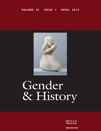
Gender and History
Scope & Guideline
Bridging Disciplines: Gender and Historical Inquiry
Introduction
Aims and Scopes
- Interdisciplinary Gender Studies:
The journal focuses on the interplay between gender and historical events, encouraging contributions that draw from various disciplines including sociology, anthropology, cultural studies, and literary criticism. - Exploration of Historical Narratives:
It critically examines how gender influences historical narratives, highlighting the experiences and contributions of women, men, and non-binary individuals throughout history. - Diverse Cultural Contexts:
The journal emphasizes research from a global perspective, reflecting on gender issues in different cultural contexts and historical periods, thus promoting a more inclusive understanding of gender history. - Power Dynamics and Social Structures:
Contributions often explore the relationship between gender and power, analyzing how social structures and institutions shape gendered experiences and identities. - Activism and Gender Movements:
The journal also addresses historical activism related to gender, documenting movements for women's rights, LGBTQ+ rights, and other forms of gender-based activism.
Trending and Emerging
- Transgender and Non-Binary Histories:
There is a growing emphasis on exploring transgender and non-binary identities throughout history, highlighting the experiences and contributions of these groups in various contexts. - Intersectionality in Gender Studies:
Research increasingly addresses intersectionality, examining how gender intersects with race, class, sexuality, and other social categories to shape individuals' experiences and historical narratives. - Gender and Activism:
The journal is seeing more contributions that link historical gender studies to contemporary activism, particularly in relation to women's rights, LGBTQ+ rights, and social justice movements. - Global Perspectives on Gender:
Emerging themes include a focus on non-Western histories and the global dimensions of gender, as researchers seek to decolonize gender studies and expand the narratives beyond Eurocentric frameworks. - Gendered Experiences of War and Conflict:
Recent publications increasingly explore the gendered dimensions of war and conflict, analyzing how gender roles and identities are constructed and transformed during times of violence.
Declining or Waning
- Traditional Gender Roles:
Research focusing solely on traditional gender roles without a critical examination of their historical evolution or intersectionality is becoming less common, reflecting a broader shift towards more nuanced analyses. - Binary Gender Frameworks:
Studies that strictly adhere to binary notions of gender are decreasing as the journal increasingly embraces non-binary and fluid gender identities in historical contexts. - Historical Accounts of Male Dominance:
While male perspectives remain important, there is a noticeable decline in papers that solely recount male-dominated narratives without integrating the experiences of marginalized genders.
Similar Journals

Anaquel de Estudios Arabes
Advancing Knowledge in Arab StudiesAnaquel de Estudios Arabes is a distinguished academic journal dedicated to the field of Arab studies, offering a platform for original research and critical discussions that span various disciplines. Published by UNIV COMPLUTENSE MADRID, SERVICIO PUBLICACIONES, this journal has established itself as a vital resource since it became Open Access in 2014, facilitating global dissemination of knowledge. With an ISSN of 1130-3964 and E-ISSN 1988-2645, the journal operates from Madrid, Spain, and supports a diverse range of topics related to history, linguistics, literature, and religious studies, earning esteemed Q2 and Q3 rankings in these categories as of 2023. Researchers, professionals, and students alike benefit from the journal's commitment to quality, reflected in its Scopus rankings across several related fields. As it approaches a pivotal period from 2019 to 2024, the Anaquel de Estudios Arabes continues to contribute significantly to the intellectual landscape of Arab studies, engaging scholars who seek to deepen their understanding of the complex cultural and linguistic heritage of the Arab world.
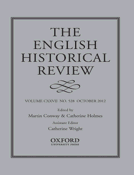
ENGLISH HISTORICAL REVIEW
Unveiling the Past, Shaping the FutureThe English Historical Review, published by Oxford University Press, stands as one of the foremost journals in the field of history, with a remarkable legacy that dates back to 1886. With an ISSN of 0013-8266 and an E-ISSN of 1477-4534, the journal serves as a vital platform for the dissemination of scholarly research and critical analysis among historians and researchers alike. It boasts an impressive positioning in the academic landscape, currently ranking in the Q2 category for History and occupying the 60th percentile in the Scopus ranks within the Arts and Humanities. Although it operates under a subscription model, the English Historical Review continues to attract contributions that shape our understanding of historical narratives and methodologies. Researchers, professionals, and students will find its rich content indispensable for both their studies and professional practice, making it a pivotal resource for advancing the discipline of history.
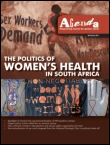
Agenda-Empowering Women for Gender Equity
Championing Research for Gender Equality.Agenda-Empowering Women for Gender Equity, published by Routledge Journals, Taylor & Francis Ltd, serves as a pivotal platform in the field of Gender Studies, offering critical insights and research aimed at promoting gender equity and empowering women. With an ISSN of 1013-0950 and an E-ISSN of 2158-978X, this esteemed journal has been committed to publishing rigorous research since its inception in 1987, showcasing works that address both historical and contemporary gender issues until 2020 and resuming again in 2022. As a Q3 journal within its category, it holds an essential position in the academic landscape, ranked #119/213 in the Scopus database, reflecting its resilience and relevance in addressing the complexities of gender dynamics. While it does not currently offer open access options, the journal remains a crucial resource for researchers, professionals, and students dedicated to understanding and addressing the nuances of gender equity in various contexts.
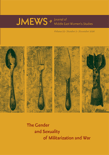
Journal of Middle East Womens Studies
Illuminating Women's Voices in the Middle EastJournal of Middle East Women's Studies, published by DUKE UNIVERSITY PRESS, is a pivotal scholarly journal dedicated to advancing the understanding of women's experiences in the Middle East through interdisciplinary research. With an ISSN of 1552-5864 and an E-ISSN of 1558-9579, this journal provides a platform for critical discourse among academics, policymakers, and practitioners, illuminating the diverse challenges and achievements faced by women in this culturally rich region. Operating without Open Access, the journal facilitates access to cutting-edge scholarship spanning cultural studies, gender studies, history, sociology, and political science, as reflected in its 2023 quartile rankings across various categories. With convergence years from 2013 to 2024, the journal plays an essential role in shedding light on the intersection of gender and cultural dynamics in contemporary Middle Eastern societies. Its contribution is significant for researchers, professionals, and students seeking comprehensive insights into these complex issues.
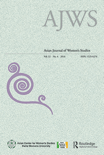
ASIAN JOURNAL OF WOMENS STUDIES
Illuminating Women's Studies in Diverse Cultures.ASIAN JOURNAL OF WOMENS STUDIES, published by Taylor & Francis Ltd, is a distinguished scholarly journal serving the field of Gender Studies since its inception in 1996. With an ISSN of 1225-9276 and an E-ISSN of 2377-004X, this journal is strategically positioned in the United Kingdom, contributing valuable insights and rigorous research to discussions surrounding women's studies in Asia. Currently ranked in the Q2 quartile of Gender Studies by Scopus, the journal holds an impressive rank of 83 out of 213, placing it within the 61st percentile of its category. The ASIAN JOURNAL OF WOMENS STUDIES aims to bridge academic scholarship and real-world gender issues, inviting contributions that encompass a wide range of topics from feminist theory to socio-political analysis. While it does not operate under an Open Access model, it remains committed to enhancing knowledge in gender studies, making it an essential resource for researchers, professionals, and students dedicated to understanding and advocating for gender equality and women's rights across diverse cultural landscapes.

Vestnik Sankt-Peterburgskogo Universiteta-Istoriya
Fostering Innovative Ideas in Historical ResearchVestnik Sankt-Peterburgskogo Universiteta-Istoriya is a distinguished academic journal published by the St Petersburg University Press, specializing in the field of History. As an influential platform since its inception in 2017, the journal has rapidly gained recognition, achieving a commendable Q2 ranking in History for 2023 and ranking #631 out of 1760 in Scopus's category of Arts and Humanities. With an emphasis on fostering scholarly discourse and disseminating high-quality research, it presents a curated selection of original research articles, critical reviews, and historical analyses, appealing to historians, researchers, and students alike. Operating from Russia, Vestnik Sankt-Peterburgskogo Universiteta-Istoriya serves not only as an incubator for innovative ideas but also as a bridge for international collaboration in the historiographical community. Although it currently does not offer open access, the journal's commitment to academic rigor and relevance ensures its continued impact in the field, with converged years extending to 2024, providing a rich archive for future scholars to engage with.
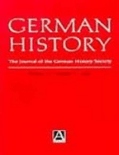
German History
Advancing Scholarship in German Historical StudiesGerman History is a leading academic journal published by Oxford University Press, focusing on the rich and multifaceted history of Germany from the medieval period to contemporary times. With a strong emphasis on interdisciplinary approaches, this journal invites contributions that explore social, cultural, political, and economic aspects of German history. Established in 1984, and with comprehensive publication coverage from 1984 to 1994 and from 1996 to 2024, German History occupies a significant place in the historical field, currently ranked in the Q2 category as per the 2023 Scopus rankings. Although it does not offer open access options, the journal continues to uphold academic rigor and scholarly excellence, making it a crucial resource for researchers, professionals, and students engaged in the study of German history. With a commitment to fostering high-quality research and dialogue, German History remains an essential platform for critical discourse and groundbreaking scholarship in the field.
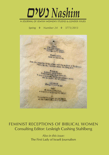
Nashim-A Journal of Jewish Womens Studies & Gender Issues
Connecting Cultures, Challenging NormsNashim: A Journal of Jewish Women's Studies & Gender Issues, published by Indiana University Press, stands as a pivotal platform for interdisciplinary scholarship at the intersection of Jewish studies, gender studies, and cultural discourse. With an ISSN of 0793-8934 and e-ISSN 1565-5288, this journal offers a vital repository of research and critical analysis, specifically highlighting the experiences and contributions of Jewish women across historical and contemporary contexts. Although classified in Q4 of the 2023 category quartiles for Arts and Humanities, Cultural Studies, and Gender Studies, it serves to amplify underrepresented voices and themes that are crucial for understanding societal dynamics. The journal spans from 2013 to 2024 and welcomes contributions that engage thoughtfully with gender issues in Jewish contexts, making it an essential resource for researchers, educators, and students alike, who are dedicated to exploring the rich complexities within this field of study. While Open Access is not currently supported, access to its in-depth articles can be sought through institutional databases and libraries, ensuring that its impactful research reaches those who seek it.
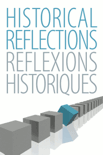
HISTORICAL REFLECTIONS-REFLEXIONS HISTORIQUES
Exploring New Dimensions of Historical UnderstandingHistorical Reflections / Reflexions Historiques is a pivotal academic journal in the field of history, published by Berghahn Journals. Established to provide a platform for innovative historical scholarship, the journal offers a unique blend of theoretical discussions and empirical studies that critically engage with new interpretations and methodologies. With a robust reputation evidenced by its category ranking in the 2023 Q3 History quartile and a Scopus ranking of #1164 in the Arts and Humanities, Historical Reflections serves as an essential resource for researchers, professionals, and students alike. Although the journal is not available through open access, it contributes significantly to historical discourse through its diverse range of articles, fostering a deeper understanding of past events and their implications for the present and future. As it continues to evolve from its inception in 1977 to the present day, Historical Reflections remains committed to advancing the field through rigorous analysis and scholarly debate.
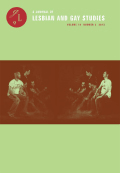
GLQ-A JOURNAL OF LESBIAN AND GAY STUDIES
Illuminating the complexities of sexuality and gender.GLQ: A Journal of Lesbian and Gay Studies, published by Duke University Press, is a pioneering academic journal that has made significant contributions to the critical discourse around LGBTQ+ issues since its inception in 1996. With an ISSN of 1064-2684 and an E-ISSN of 1527-9375, this esteemed publication engages a wide audience of researchers, professionals, and students in cultural studies, gender studies, and queer theory. Ranked in Q2 for Cultural Studies and Q3 for Gender Studies in 2023, GLQ is recognized for its rigorous scholarship and innovative approaches to the study of sexuality and identity. The journal offers an invaluable platform for interdisciplinary dialogue, exploring the complexities of LGBTQ+ lives, cultures, and movements. Although not open access, GLQ remains a vital resource for those looking to stay at the forefront of scholarship in these dynamic fields. Whether you are a seasoned researcher or a newcomer to queer studies, GLQ provides essential insights and fosters ongoing conversations that challenge and expand our understanding of sexuality and gender.